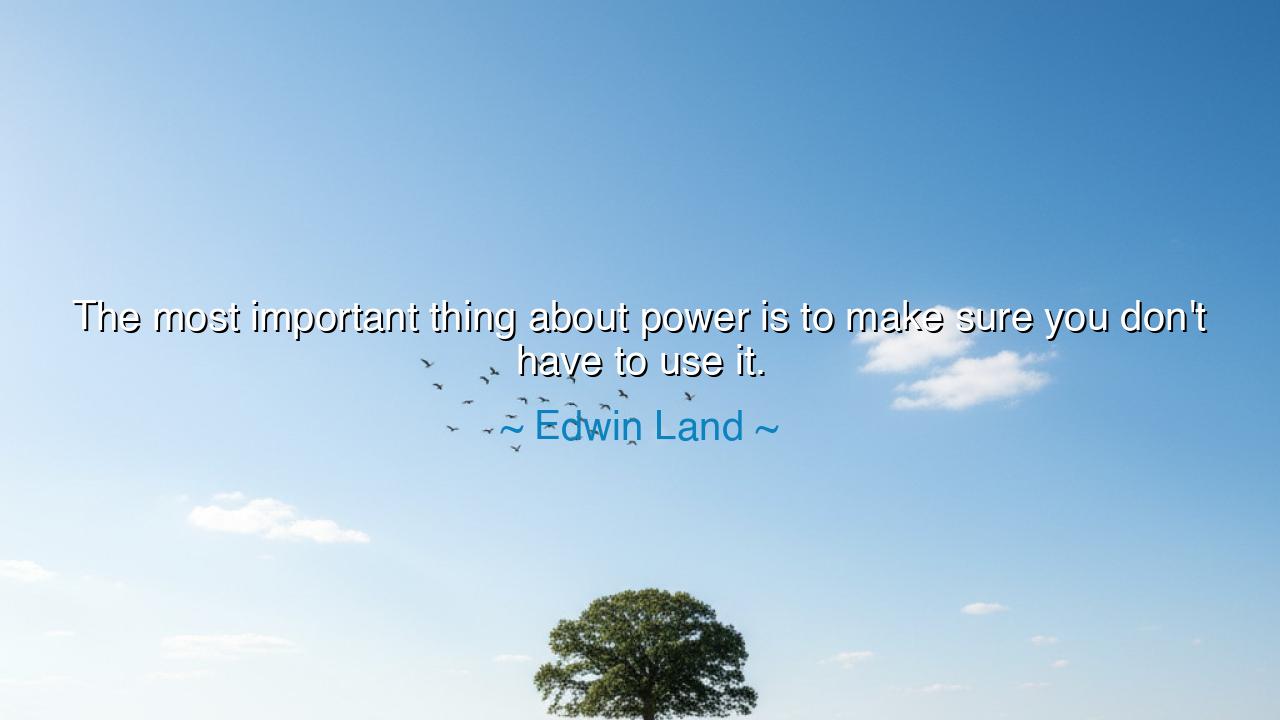
The most important thing about power is to make sure you don't






Edwin Land, the visionary who gave the world the instant photograph, spoke with the voice of a strategist and sage when he declared: “The most important thing about power is to make sure you don’t have to use it.” In these words lies a profound truth: the greatest power is not in constant display or reckless use, but in restraint, in holding authority so steady that its very presence preserves order without violence. To wield power rightly is to make it unnecessary.
The essence of this teaching is that true power is silent, like a mountain that does not need to roar to be feared, or like the deep sea whose strength is known without waves. The weak flaunt what little they have; the strong rarely need to show it. When power must be used constantly, it reveals insecurity. But when it is so steady, so wisely held, that it commands respect without action, then it is at its highest form.
History testifies. The Cold War between the United States and the Soviet Union was a conflict fought not with open battles, but with the shadow of power. Nuclear arsenals stood ready, yet their true strength lay in deterrence—the fact that they need never be used. This tense balance, called mutually assured destruction, was a terrifying proof of Land’s wisdom: the most important thing about power was that both sides ensured they did not unleash it. The restraint itself preserved the world.
So too in the realm of leadership. George Washington, though victorious in revolution, surrendered the presidency after two terms. His choice showed that true power did not lie in clinging to office or wielding it for personal glory, but in creating a tradition of restraint that has endured for centuries. By not using his power to dominate, he made it more powerful still, for it became an example that strengthened a nation.
O children of tomorrow, learn this lesson well: the greatest rulers, warriors, and leaders are not those who strike most often, but those whose presence alone keeps strife at bay. Seek not to brandish power as a sword in constant battle, but to hold it like a shield—strong, steady, and seldom raised. For the highest form of mastery is not in conquering others, but in wielding such authority that conquest is never needed. Thus Land teaches us: the triumph of power is its restraint.






GMVu Giang My
This quote seems to suggest that real power comes from the ability to resolve situations without force, which I find refreshing. However, I’m curious—does this mean that power should only be used as a last resort, or is it about preventing the need for power altogether? In situations where conflicts or disputes arise, how can one maintain the ability to resolve them without having to exert force or control? Is there a way to foster influence without ever needing to step into authority?
NKNguyen Nam Khanh
I find this quote thought-provoking because it seems to advocate for a more peaceful, almost passive approach to leadership. But I wonder if this is always achievable. In certain contexts, especially in competitive or high-pressure environments, isn’t power sometimes essential to get things done? How do you balance the desire to be non-authoritarian with the need to assert authority when circumstances demand it?
VTHoan Vu thi
I think this quote highlights an interesting point about leadership. The most effective leaders aren’t the ones who constantly assert their power, but those who inspire loyalty and respect so that power isn’t needed. But is this possible in all situations? Can one ever avoid using power completely, especially in moments of conflict or crisis? I guess it comes down to how you define power and whether influence alone is enough in tough circumstances.
CHCuong Huy
This idea is intriguing because it flips the usual view of power on its head. Instead of seeing power as something to be exercised, it suggests that the true power lies in the restraint of it. But how do you build trust or command respect without using power in certain situations? Can you really rely on people to follow your lead if they don’t perceive your power as something that can be enforced when needed?
ANTram Anh Nguyen
I really like the perspective in this quote. It suggests that true power lies in the ability to maintain control without having to force it. It makes me think of leaders who command respect through their actions rather than by wielding authority. But is this approach always practical? In some situations, especially in high-stakes environments, isn’t there a time when using power is necessary to maintain order or prevent harm?